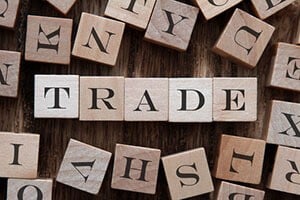Editor's Note: Back in 2015, Tom shared this three-question quiz to help readers identify their trading type. With that insight, you can tailor your approach to match your financial goals and risk tolerance with the strategies best suited for both. With a new investing year ahead, this could be critical to your success in the markets. Here's Tom...
All over social media there are numerous quizzes and surveys that ask you to go through it to find out what your spirit animal is, what your ideal man/woman is, what your favorite pet is, which superhero you are...
But here's one that's much more interesting and useful!
When it comes to trading, determining what type of trader you are will help dictate what types of trading strategies you use and how often you use them.
The good news is, it's pretty easy to figure out what kind of trader you are. In fact, it's almost as easy as taking a quiz on social media... except it can be a lot more lucrative too.
Today, I'm going to tell you how to determine what kind of trader you are and why it's absolutely crucial to your success in the markets...
Start with Three Simple Questions

If you are a beginner, you may think you don't know enough about trading to determine what type of trader you are. But not to worry - there are people who have been trading for years who, if you held their feet to the fire, would be hard-pressed to give a definitive answer.
Of course, your type may very well evolve over time as you trade and discover new strategies, and you may find yourself morphing in and out of trader types until you figure out which type suits you best.
So how do you know what kind of trader you are? All you have to do is answer three simple questions.
Are You a Discretionary Trader or a Rules-Based Trader?
Rules-based traders adhere to a set of rules about how they will conduct each trade. How and when to enter, when to take profits, and how and when to exit are all predetermined by their rules-based approach. Now, these systems do not account for ever-changing market conditions, but they do allow traders to remove themselves - and their emotions - from the decision-making process. If the criteria of the rules-based approach are met, a trade is executed no matter what.
I showed my readers the incredible opportunity to score 69 triple-digit winning moves in 2017. Now I've pinpointed five brand-new opportunities that I expect to return a combined 946.14%. Even better, these all start on Jan. 2 - the very first trading day of the year. Here's what you need to know...
Discretionary traders do not throw rules out the window entirely - in fact, many of them have predetermined entry and exit strategies, but those strategies may be contingent upon subjective criteria. Discretionary traders may be using decades-old chart patterns to enter and exit their trades, but how they interpret those stock charts is completely subjective. Discretionary traders allow themselves a certain amount of discretion - hence the term - when making trades, rather than leaving every decision up to a rules-based approach.
That will help you determine what strategy or strategies you will focus on and the amount of time you will need to spend on finding and managing these trades, so you will know ahead of time how long you can expect these trades to take.
Are You a Directional or Non-Directional Trader?
[mmpazkzone name="in-story" network="9794" site="307044" id="137008" type="4"]
If you're interested in trading securities that move up or down, you're a directional trader.
Directional traders assess the direction of the broader markets or individual securities and then trade accordingly, taking long positions on securities they believe will go up in price and short positions on securities they believe will go down in price. Directional traders can make great use of options, as they don't need to wait for a stock to move in order to capture big profits.
But what if you don't need the stock to move?
If you just need a stock to stay at or near a specific price, then you're a non-directional trader.
Non-directional trading strategies are good for when the broader markets or specific securities aren't moving dramatically one way or the other. Non-directional traders don't need to know or be able to predict whether a security will go up or down in price and can trade to take advantage of moves in either direction. Options are a fantastic way to trade non-directionally, with strategies like straddles and strangles.
Are You a Short-Term Trader or a Long-Term Trader?
Short-term traders focus on trades that last anywhere from a few minutes to a month.
A day trader attempts to profit by making dozens of trades during the trading day, exiting all trades before the market closes. Day traders are looking to make a little bit off each trade, capitalizing in small intraday fluctuations in securities prices.
A scalper also holds numerous trades for a very short amount of time intraday. But instead of profiting off small movements in price, the scalper looks to profit off the bid-ask spread.
A swing trader uses technical analysis to determine short-term price movements. The swing trader usually targets trades that will take no longer than four days.
If you prefer to stay in your trades longer than a month, that means you're a long-term trader.
Buy-and-hold traders do just that - buy stocks and hold them over a number of years while they - presumably - rise in value. Buy-and-hold traders don't worry about short-term price fluctuations or even broader market conditions. They simply wait for the value of their investments to increase.
Income traders buy stocks specifically to collect regular dividend payments. Typically, income traders are also buy-and-hold traders and stay in trades a number of years.
Value traders select stocks they believe are trading for less than their intrinsic value, usually by comparing a stock's long-term fundamentals with its current price.
Once you've answered these three questions, you can begin to explore different trading strategies that work for you.
Be Open to Change
The quest to determine what type of trader you are may require experiencing and paper trading different strategies before you find one that you're comfortable with.
What I have given you is a framework to start with. The more you trade, the better you'll understand what you want out of trading, how much time you want to spend managing your trades, and how much risk you want to take on. You'll have a better understanding of what kind of trader you are - and you'll know what strategies you're comfortable with.
Also, the more you trade, the more comfortable you may become with more complex trading strategies, faster trades, and higher risk. Or you may not. Just be open to the possibility that you may change your trading style as you gain more experience and try new ways of playing the markets.
Tom Gentile is America's No. 1 Pattern Trader, and for good reason. Since 2009, he's taught over 300,000 traders his option trading secrets, including how to find low-risk, high-reward opportunities. Now he's sharing that insight with you. To get started, just click here - you'll get Tom's twice-weekly Power Profit Trades delivered directly to your inbox, free of charge.
Don't Miss: Score THOUSANDS in Extra Cash in Five Simple Moves
It's the most lucrative way to kick-start your 2018 income stream, and it all starts on Jan. 2, after the opening bell.
That's when you could be in position to receive my very first trade recommendations of the year.
Follow the instructions, and you could be in position to score an extra $7,320.70, $21,962.10, even $73,207.00 in just five simple moves.
Here's what you need to know to "get in" on the action.
About the Author
Tom Gentile, options trading specialist for Money Map Press, is widely known as America's No. 1 Pattern Trader thanks to his nearly 30 years of experience spotting lucrative patterns in options trading. Tom has taught over 300,000 traders his option trading secrets in a variety of settings, including seminars and workshops. He's also a bestselling author of eight books and training courses.



